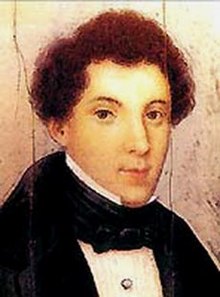Remove ads
胡安·克里索斯托莫·雅各布·安东尼奥·德·阿里亚加-巴尔佐拉(西班牙語:Juan Crisóstomo Jacobo Antonio de Arriaga y Balzola;1806年1月27日—1826年1月17日),西班牙作曲家。早年以神童著称,他跟莫扎特同月同日出生,被誉为“西班牙的莫扎特”。[1]在巴黎音乐学院学习期间,不幸因肺病逝世,死时未满20岁。其作品虽数量很少,但体现出较高的创作水平,令后人为他的早逝扼腕叹息。
- Nada y mucho, for octet (1817)
- Overture "Nonetto", Op. 1, for small orchestra (1818)
- Military March, Op. 2, for band (1819)
- Hymn "Ya luce..." ("Patria"), Op. 3, for choir and orchestra (1819)
- Hymn "Cántabros nobles...", Op. 4, for choir and orchestra (1819)
- Romanza, for piano (1819)
- Los esclavos felices, opera in two acts for soloists, choir and orchestra (1820) (lost, only the overture and sketches survived)
- Tema variado en cuarteto, Op. 17, for string quartet (1820)
- Overture in D major, Op. 20, for orchestra (1821)
- Motet "Stabat Mater", for two tenors, bass and orchestra (1821)
- Motet "O Salutaris", for two tenors, bass and orchestra (1821)
- Variaciones sobre el tema de la Húngara, Op. 22, for violin and basso continuo (1821)
- Variaciones sobre el tema de la Húngara, Op. 23, for string quartet (1822)
- Aria de Beltrán, for tenor and orchestra (1822)
- Three Etudes or Capriccios, for piano (1822)
- Motet "O salutes hostia", for two tenors, basso continuo and string orchestra (1823)
- Fugue in eight voices "Et vitam venturi" (1823) (lost)
- Three Quartets (1823)
- String Quartet No. 1 in D minor
- String Quartet No. 2 in A major
- String Quartet No. 3 in E flat major
- Symphony in D major, "Sinfonía a gran orquesta" (1824)
- Canon of Henneville (1824)
- Mass in four voices (1824) (lost)
- Salve Regina (1824) (lost)
- Médée, opera for soprano and orchestra (1825) (unfinished, only the aria survived)
- Ma tante Aurore (All' Aurora), duo for tenor, basso continuo and orchestra (1825)
- Edipo, for tenor and orchestra (1825) (only the Aria of Polinicio survived)
- Herminie, cantata for soprano and orchestra (1825)
- Agar, cantata for soprano, tenor and orchestra (1825)
Remove ads
- Audi benigne, for choir.
Wikiwand in your browser!
Seamless Wikipedia browsing. On steroids.
Every time you click a link to Wikipedia, Wiktionary or Wikiquote in your browser's search results, it will show the modern Wikiwand interface.
Wikiwand extension is a five stars, simple, with minimum permission required to keep your browsing private, safe and transparent.
Remove ads
